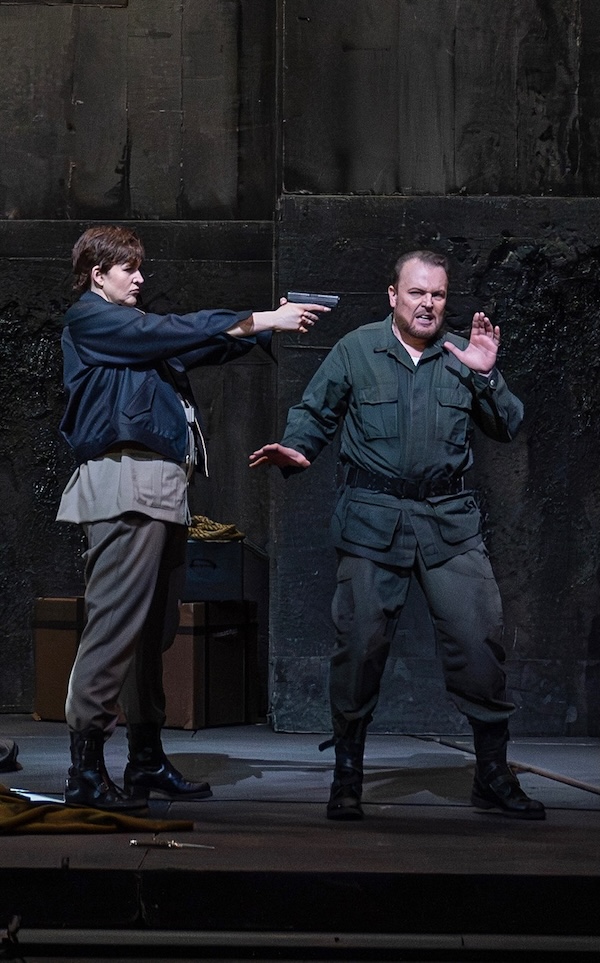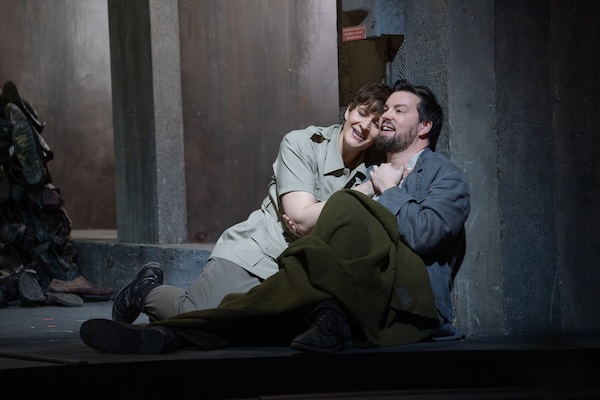Davidsen dominates all in Met’s “Fidelio”

The reason to run and see the Metropolitan Opera’s revival of Fidelio can be summed up in two words: Lise. Davidsen.
The production opened Tuesday night with fine singing up and down the cast, affecting choruses, and mostly superb orchestral playing under conductor Susanna Mälkki.
But it was the renowned Norwegian soprano, imposing of voice and stature, who was the “draw,” and rightly so. Beethoven’s not-very-operatic opera could hardly be described as a vehicle for sopranos, but Davidsen invested the role of Leonore/Fidelio with uncommon musicality and passion.
Furthermore, opportunities to hear her may become scarce in the near future, owing to her recently-announced pregnancy with twins. Fortunately, she was able to keep her engagement for this revival of the 2000 Jürgen Flimm production (and to safely descend a three-story-high ladder into Florestan’s dungeon in Act II).
It’s better not to think too literally about the Flimm setting, in which the 16th-century Spanish characters of the libretto by Joseph von Sonnleithner (and others) are updated to the mid-20th century. What was going on in Spain 70 years ago was not wise royal government with the occasional bad actor like Don Pizarro, but a fascist dictatorship with few happy endings for prisoners.
Beethoven and his collaborators, with an eye on the imperial censors, set their drama of tyranny and the courage to overcome it at a safe historical distance, and leaving it generic in the viewer’s mind still seems the best way to contemplate the opera’s moral fable.
Furthermore, revival stage director Gina Lapinski seems to have softened a few of the more violent implications of Flimm’s production. The warden’s young assistant Jaquino, affectingly sung by tenor Magnus Dietrich in his company debut, pursued Marzellina as more Beethoven’s lovesick swain than the production’s menacing abuser. At the end, Pizarro is simply led off to face justice, not bloodied with a rope around his neck.
Unfortunately, one also felt hardly any real sense of danger to the prisoner Florestan. Beethoven, a master at evoking emotional states—see the desolate, dissonant prelude to Florestan’s lonely aria—seems to have been better at suspense in a musical composition than at suspense on stage. But the lowered heat of this staging also played a part.
So where did that leave the singer-actors on stage? Pretty much on their own, vocally and dramatically. But Lise Davidsen on her own is worth a stageful of average singers in a hot production, and the rest of Tuesday’s cast stepped up with committed performances as well.

Playing the underdog in this fight, the six-foot-two Davidsen took care not to tower over the rest of the cast too much. Still, her “Fidelio” came off as less the vulnerable youth than the high school basketball star. No wonder Marzelline fell for him and not the whiny Jaquino.
A dramatic flaw in the opera’s libretto is its shabby treatment of Marzelline, the warden’s daughter, who is used for a bit of mistaken-identity comedy in the opening scenes, but discarded when the true identity of “Fidelio” is revealed at the end. Flimm’s production tries to tie up this loose end by showing Jaquino attempting to console her, but this sour note remained amid all the celebrations of justice and wifely love. Marzelline was sweetly and penetratingly sung by soprano Ying Fang.
Bass René Pape reprised the role of the warden Rocco, which he originated in this production 25 years ago, now a benign presence in warm, slightly rough voice.
Davidsen stole in on this domestic trio as discreetly as she could, but the performance was still interrupted by applause. (Pape, a Met veteran, had been similarly greeted earlier.) The reason became clear at the first notes out of her mouth, joining in the quartet “Mir ist so wunderbar” with a voice arrestingly present even in the piano dynamic.
But the character Leonore—and Davidsen’s voice—really spread their wings in the tender-to-determined aria “Komm Hoffnung” near the end of Act I, as the singer’s golden and voluminous tone rolled out into the house, easily spanning a single leap of almost two octaves and closing on a robust high B.
Tenor David Butt Philip’s turn as Florestan came at the beginning of Act II, in a horrified crescendo on the word “Gott!” followed by a despondent “welch’ Dunkel hier” (what darkness is here). His aria in the dungeon revealed a voice well matched to Davidsen’s, in timbre at least, clear and full-bodied from bottom to top. His tone was modulated at first to convey the starving prisoner’s debilitated state, but later blossomed in their impassioned duets.
Bass-baritone Tomasz Konieczny was in sharply focused voice and dramatically convincing as the scary, corrupt Pizarro, whose rages were potentially lethal to Florestan and anybody else who crossed him. In contrast, at opera’s end the king’s minister Don Fernando, as embodied with heart and dignity by bass Stephen Milling, calmly dispensed justice to the wicked and praise to the brave and faithful Leonore.
The men of the Met chorus, directed by Tilman Michael, reflected the sun’s warmth in their tone as prisoners briefly released into the prison yard, singing the chorus “O welche Lust.” Among their number, tenor Jonghyun Park and bass Jeongcheol Cha provided brief, affecting solos. The full chorus of released prisoners and townspeople made a joyful racket in the opera’s closing pages, because nobody whoops it up like Beethoven when he’s in the mood.
Conductor Mälkki gave an appropriately upbeat feeling to the Fidelio Overture—a lighter scene-setter than the massive Leonore overtures the composer first tried with this opera—then maintained a brisk pace through the comical and darker scenes of Act I. She also expertly managed the long climb from the frozen desolation of Florestan in his cell to his dramatic rescue by Leonore. Persistent cracked notes in the all-important horns of Beethoven’s score were the most audible flaws in an otherwise splendid outing for the Met orchestra.
Fidelio runs through March 15. metopera.org
